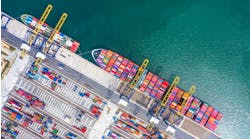In 2024, the US added 244,000 manufacturing jobs via reshoring and foreign direct investment (FDI), according to a new report, Reshoring Initiative 2024 Annual Report.
While early 2025 job announcements are trending lower, policy stability could quickly unlock another wave of reshoring-driven investment, the Reshoring Initiative noted.
Since 2010, over 2 million jobs have been announced as U.S. companies and foreign investors bring manufacturing closer to U.S. customers, driven by rising geopolitical risk, supply chain vulnerabilities, and growing bipartisan support for American industrial competitiveness.
“Reindustrializing America is impossible without reshoring, FDI, and strong industrial policy,” said Harry Moser, president of the Reshoring Initiative, in a statement. “Our data shows tremendous progress, but the U.S. must address workforce shortages and manufacturing cost disadvantages to maintain this momentum.”
Key Findings from the Report:
Reshoring by U.S.-headquartered companies outpaced FDI by foreign-headquartered companies by the largest margin on record in 2024.
High-tech industries are driving growth: 88% of 2024 jobs were in high or medium-high tech sectors, rising to 90% in early 2025.
Industries leading in 2024: Computer & Electronics, Electrical Equipment (including EV batteries and solar), and Transportation Equipment.
Texas, South Carolina, and Mississippi are the top 2025 states for reshoring and FDI.
Asia remains the largest source of reshored + FDI jobs, while South Korea, China, and Germany led among individual countries.
Tariffs are now a key motivator: Cited in 454% more cases in 2025 vs. 2024. Government incentives cited 49% less as previous subsidies phase out.
Workforce constraints loom large: U.S. manufacturing apprenticeships rose 83% over the past decade, but far more skilled workers are needed to sustain reshoring growth.
2025 Outlook: Momentum with Risks
Early 2025 data projects a potential drop to 174,000 announced jobs for the year, but that figure could climb rapidly if firms gain confidence in the permanence of new tariffs and industrial policies. Many large, tentative announcements are contingent on clearer signals from the administration.
Key risks:
- Policy uncertainty is delaying investment decisions.
- Potential retaliatory tariffs could dampen U.S. export opportunities.
- Low-tech industries remain under-reshored, leaving U.S. supply chains vulnerable for mass-market consumer goods.
- Without comprehensive reforms, U.S. manufacturing costs remain 10–50% higher than offshore competitors, driving most import decisions.
A Call for Smarter Industrial Policy
The Reshoring Initiative advocates for a true national industrial policy focused on:
- Massive investment in skilled workforce development (modeled after German apprenticeships).
- A 20% lower USD to improve global cost competitiveness.
- Retention of immediate expensing of capital investments.
- Smarter use of tariffs and Total Cost of Ownership (TCO) analysis to drive lasting reshoring.
“The U.S. can’t count on tariffs alone to restore its industrial leadership,” said Moser. “It must level the cost playing field and build a skilled workforce to truly compete and win globally.”



